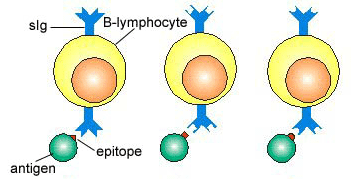

|
The BcePred server predicts B cell epitopes based on physico-chemical properties of amino acids.
Bcepred has been tested on B cell epitope database (BCIPEP), and will therefore presumbly have better performance for prediction of B cell epitope of the antigen. Bcepred can predict continuous B cell epitopes.
B-cell epitope plays an important role in humoral response and also in synthetic vaccine design. Identified properties of B cell epitope includes hydrophilicity, flexibility/mobility, accessibility, polarity, exposed surface and turns. Quantification of these properties is determined by assigning a value to each of the 20 natural amino acids. The server is able to predict epitopes with 58.7% accuracy using combined methods at a threshold of 2.38.
| Instructions | Output format | Data Sets | Algorithm | Team |
The sequence must be written using the one letter
amino acid code:
`acdefghiklmnpqrstvwy' or
`ACDEFGHIKLMNPQRSTVWY'.
Other letters will be converted to `X' and treated as unknown
amino acids.
Other characters, such as whitespace and
numbers, will simply be ignored.